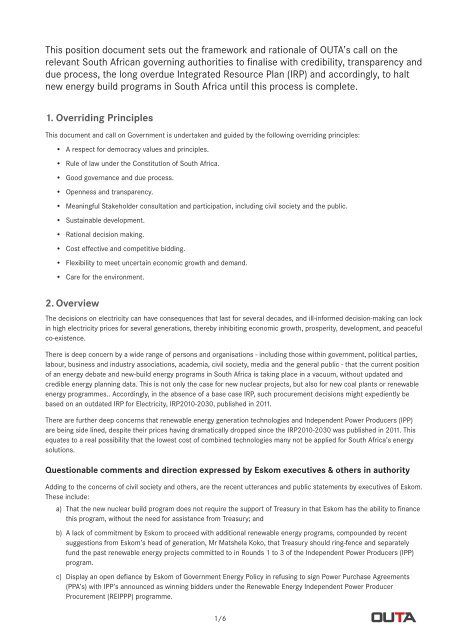Obscure Electricity Planning is Detrimental to South Africa
IRP-Campaignd
IRP-Campaignd
Create successful ePaper yourself
Turn your PDF publications into a flip-book with our unique Google optimized e-Paper software.
Th<strong>is</strong> position document sets out the framework and rationale of OUTA’s call on the<br />
relevant <strong>South</strong> <strong>Africa</strong>n governing authorities <strong>to</strong> final<strong>is</strong>e with credibility, transparency and<br />
due process, the long overdue Integrated Resource Plan (IRP) and accordingly, <strong>to</strong> halt<br />
new energy build programs in <strong>South</strong> <strong>Africa</strong> until th<strong>is</strong> process <strong>is</strong> complete.<br />
1. Overriding Principles<br />
Th<strong>is</strong> document and call on Government <strong>is</strong> undertaken and guided by the following overriding principles:<br />
• A respect for democracy values and principles.<br />
• Rule of law under the Constitution of <strong>South</strong> <strong>Africa</strong>.<br />
• Good governance and due process.<br />
• Openness and transparency.<br />
• Meaningful Stakeholder consultation and participation, including civil society and the public.<br />
• Sustainable development.<br />
• Rational dec<strong>is</strong>ion making.<br />
• Cost effective and competitive bidding.<br />
• Flexibility <strong>to</strong> meet uncertain economic growth and demand.<br />
• Care for the environment.<br />
2. Overview<br />
The dec<strong>is</strong>ions on electricity can have consequences that last for several decades, and ill-informed dec<strong>is</strong>ion-making can lock<br />
in high electricity prices for several generations, thereby inhibiting economic growth, prosperity, development, and peaceful<br />
co-ex<strong>is</strong>tence.<br />
There <strong>is</strong> deep concern by a wide range of persons and organ<strong>is</strong>ations - including those within government, political parties,<br />
labour, business and industry associations, academia, civil society, media and the general public - that the current position<br />
of an energy debate and new-build energy programs in <strong>South</strong> <strong>Africa</strong> <strong>is</strong> taking place in a vacuum, without updated and<br />
credible energy planning data. Th<strong>is</strong> <strong>is</strong> not only the case for new nuclear projects, but also for new coal plants or renewable<br />
energy programmes.. Accordingly, in the absence of a base case IRP, such procurement dec<strong>is</strong>ions might expediently be<br />
based on an outdated IRP for <strong>Electricity</strong>, IRP2010-2030, publ<strong>is</strong>hed in 2011.<br />
There are further deep concerns that renewable energy generation technologies and Independent Power Producers (IPP)<br />
are being side lined, despite their prices having dramatically dropped since the IRP2010-2030 was publ<strong>is</strong>hed in 2011. Th<strong>is</strong><br />
equates <strong>to</strong> a real possibility that the lowest cost of combined technologies many not be applied for <strong>South</strong> <strong>Africa</strong>’s energy<br />
solutions.<br />
Questionable comments and direction expressed by Eskom executives & others in authority<br />
Adding <strong>to</strong> the concerns of civil society and others, are the recent utterances and public statements by executives of Eskom.<br />
These include:<br />
a) That the new nuclear build program does not require the support of Treasury in that Eskom has the ability <strong>to</strong> finance<br />
th<strong>is</strong> program, without the need for ass<strong>is</strong>tance from Treasury; and<br />
b) A lack of commitment by Eskom <strong>to</strong> proceed with additional renewable energy programs, compounded by recent<br />
suggestions from Eskom’s head of generation, Mr Matshela Koko, that Treasury should ring-fence and separately<br />
fund the past renewable energy projects committed <strong>to</strong> in Rounds 1 <strong>to</strong> 3 of the Independent Power Producers (IPP)<br />
program.<br />
c) D<strong>is</strong>play an open defiance by Eskom of Government Energy Policy in refusing <strong>to</strong> sign Power Purchase Agreements<br />
(PPA’s) with IPP’s announced as winning bidders under the Renewable Energy Independent Power Producer<br />
Procurement (REIPPP) programme.<br />
1/6


